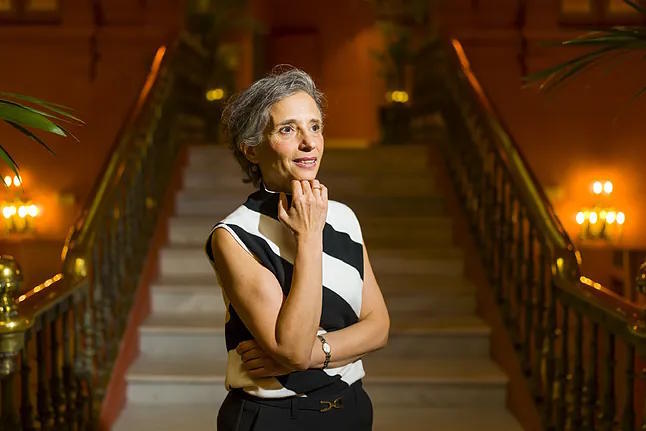What line of thought led you from science to art, and vice versa?
They are different ways of thinking. When I entered university, the study was very demanding, and I started to need to immerse myself in other forms of expression and human creativity. Art makes me experience emotions that science does not provide me with.
What role does emotion play in observing the universe?
There is a lot of emotion in unraveling and transmitting information about the most distant galaxies or about an exoplanet orbiting a star. But there is also something very profound that connects us with the unknown, even with the transcendental. The cosmos has opened up some of the deepest questions we have asked ourselves as a species. How did everything come about? What place does the human being have in the universe?
Your book explores how art has helped disseminate science for centuries. Does it continue to do so in the information age?
It plays a very important role. Those wonderful images from the James Webb Space Telescope are of exquisite beauty, right? Well, they are somehow fake.
But what are you saying!
In astronomy, this happens constantly. Those images have been obtained with infrared light that our eyes cannot see. There are satellites that observe the cosmos in X-rays, which we also cannot see. The information from those images had to be encoded in blue or red colors, which we can perceive but are not real. There is a lot of creativity, also artistic, in those telescope images.
Astrophysical marketing...
Yes, there is a lot of that. It is essential not only for outreach but also for a professional article because we necessarily have to transform the images into something our eyes can see. The images we see are artistic recreations. Some are wonderful, but all are an illusion. There is a lot of imagination and also a point of speculation.
So the separation between sciences and humanities is not as strict as we assume from high school. Should there be more flexibility?
I wish I had learned history and philosophy better; I have missed that knowledge a lot in my career. I cannot comment on current curricula, but I do believe that we live in a society that is too hyper-specialized, both in culture and scientific research. I specialize in galaxies with supermassive black holes, which is like a tiny microscopic cell in the field of astrophysics. This specificity makes us shortsighted to a global vision, for example, understanding how we have reached the current knowledge of the cosmos. We think everything is recent, dating back to Einstein and quantum mechanics, but in reality, we are heirs to a crucible of ancient questions and ways of thinking. We adapt to the economic production of science, and I believe that is a disadvantage that blinds us to the entirety of knowledge.
How does the privatization of the space race affect scientific research?
It has a positive aspect, which is money. These are projects that public funding can hardly tackle. But it is a double-edged sword because the price to pay may be assuming that all this research will lead to a culture of space tourism or private exploitation of other planets' resources guided solely by economic gain. It is unstoppable, which is why regulation is essential.
Will we see humans set foot on Mars?
I don't know if you and I will see it, but I trust that younger people will. At this moment, it is science fiction. But we will achieve it before too long.
Why are we so fascinated with finding extraterrestrial life?
We have been considering this for over 2000 years; even Aristotle or Democritus reflected on it. It is a debate that connects the scientific, the metaphysical, the religious, and even more. It is eternal because curiosity is infinite. We have not found it yet, but it would be strange if Earth were the only place in the universe where life exists.
How do we live with the certainty that there will be questions that will never be resolved?
The most fascinating aspect of science is the journey, that collective effort that advances step by step. The great strength of science is continuous review; we must learn to live with permanent doubt.
These doubts open a space for speculation. Are there more flat-earthers now than in the Middle Ages?
Yes, indeed. In fact, it is a myth that everyone in the Middle Ages believed the Earth was flat. But you see, today, flat-earthers or creationists seem somewhat anecdotal to me; what really concerns me are the anti-vaxxers.
Q. What is the most impertinent question you have been asked? What was your response?
A. When I started studying, they asked me why I was getting into Physics, as if that was something for boys. Things have changed a lot, but there is still a certain bias.
